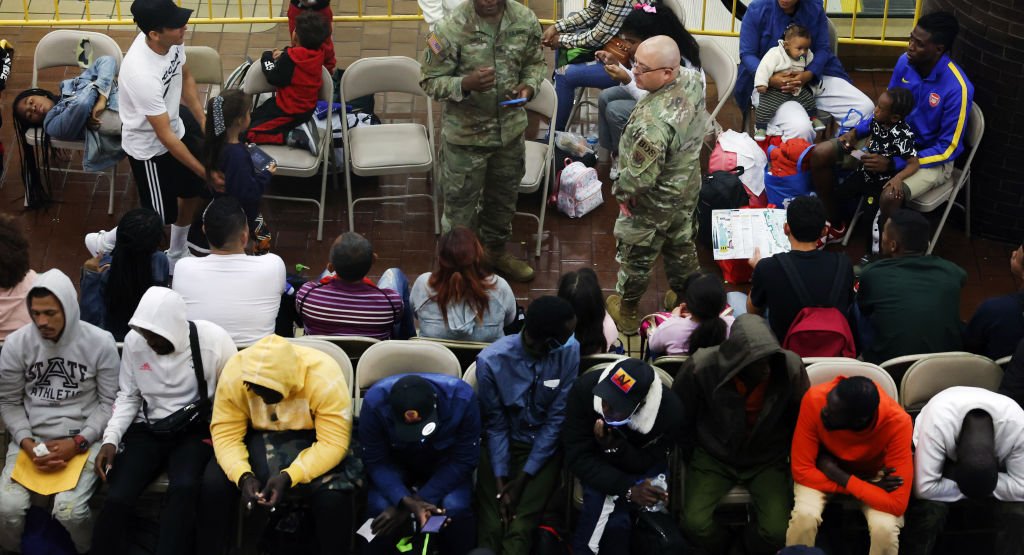New York City’s rollout of a controversial plan to give preloaded debit cards to migrant families to help them pay for food and baby supplies has taken off without a hitch, according to city officials and the vendor in charge. Still, the program is in its early stages.
The city handed out more than $6,100 in debit cards to 23 families from Monday, when distribution began, through Thursday, city spokesperson William Fowler said.
“The initial rollout of this pilot program is going according to plan,” he said in a statement. “Families are using their cards to purchase food and supplies from grocery stores and bodegas as they circulate these dollars back into the local economy.”
Mayor Eric Adams’ administration inked a no-bid, emergency deal for the program with Mobility Capital Finance, or MoCaFi, last year, with the goal of saving the city money on food for migrants, reducing food waste and supporting local businesses. The potential cost savings could be up to $600,000 a month and $7 million a year, according to Adams.
“There have not been any issues,” Nisha Baliga, MoCaFi’s head of strategy, told Gothamist on Friday. She noted the program remains in its nascent stages: “We’re working very closely with the city to report any things, but nothing so far.”
Chloe Chik, a spokesperson for City Comptroller Brad Lander, said her office cleared the MoCaFi contract after a thorough review of the emergency procurement. She added that her office is “laser-focused on holding the administration accountable for poor contracting processes.”
Ahead of the trial run, conservative commentators and some elected officials criticized the initiative, claiming it was ripe for waste, fraud and abuse. “Something’s wrong with this deal, and taxpayers are getting fleeced,” City Councilmember Bob Holden, a Queens Democrat, told the New York Post.
City officials said they are closely monitoring the pilot program to see if the number of debit cards should be increased and whether the aid could replace part of the city’s current food program for migrants, which relies on the distribution of boxed meals to thousands of families at hotels serving as emergency shelters.
The debit cards can only be used at grocery and convenience stores and bodegas, according to officials and MoCaFi staff; they won’t work at other businesses. Families who receive the assistance are required to sign affidavits stating they will only use the cards for their intended purpose. Violators could have their debit cards taken away.
Some of the criticism of the initiative has centered on the no-bid nature of the city’s contract with MoCaFi. Other migrant-related contracts have also drawn drawn scrutiny from city councilmembers and the comptroller over concerns about overspending.
Lander has since scaled back the mayor’s powers to enter into emergency deals for migrant services. But he approved the contract with MoCaFi, a financial technology company that has worked with cities including Los Angeles and St. Louis to help people who lack access to traditional banks.
New York City could pay up to $53 million under its contract with MoCaFi, a sum that includes money for the debit cards and payouts to MoCaFi, according to company and city officials. But the city will only spend the full amount if it opts to expand the program. City officials and MoCaFi’s Baliga say the contract is a “pay-as-you-go” model.
The amounts loaded on the debit cards vary depending on family size. A family of four with two children under age 5 will receive about $350 weekly through the end of their stay in a city shelter, according to the Adams administration.
The aid exceeds the benefits that other low-income city residents receive from the Supplemental Nutrition Assistance Program, also known as SNAP or food stamps, Newsweek reported. The amounts are “aligned” to the levels for SNAP and another similar program for women, infants and children, Baliga said, adding that migrant families are staying in hotel rooms without cooking appliances.
She said she was surprised by the criticism and controversy surrounding the program. “It was interesting to be part of that entire dialogue around the issue of immigration in the country,” Baliga said. “And then seeing the story get retold and so many things that were not true getting out, like that this is a credit card.”
Baliga said the program could help migrant families “get banked and be part of the mainstream financial system in an affordable way and with dignity and autonomy.”
Frank Marte, president of the Bodega and Small Business Association, which represents over 1,000 bodega owners citywide, said the program also benefits the city’s cash-strapped bodegas by encouraging migrants to patronize them.
Marte said many of the city’s bodegas, which are largely owned by immigrants, have been struggling with high utility bills, rising costs and customer drop-off since the COVID-19 pandemic started in 2020.
“They’re going to buy good food and also support the local bodega,” he said of migrants in the program.





